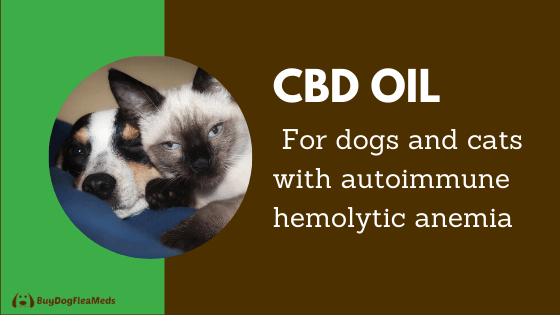CBD Oil For Dogs And Cats With Autoimmune Hemolytic Anemia
Anemia is a life-threatening condition in both dogs and cats. In this condition, the body doesn’t have enough red blood cells (RBC), which is responsible for distributing oxygen to organs and tissues. Oxygen is important to brain function and without sufficient supply, the brain may cease to operate, which can cause all bodily functions to stop.
WHAT IS AUTOIMMUNE HEMOLYTIC ANEMIA IN DOGS AND CATS
Autoimmune hemolytic anemia or AIHA is a disorder of the immune system. The body naturally produces antibodies to fight harmful foreign agents, but in the case of AIHA (particularly in secondary AIHA cases), the “foreign agent” being destroyed is actually a natural component of the blood.
When there isn’t enough oxygen being supplied to the organs due to not having sufficient RBCs, anemia develops.
AIHA is the most common autoimmune disease among dogs. Other autoimmune diseases include those that cause skin disorders. Some of them also get Systemic Lupus Erythematosus or Immune-Mediated Thrombocytopenia.
Cats also get the lupus erythematosus. They also suffer from autoimmune diseases like polyarthritis, immune-mediated thrombocytopenia and pemphigus which causes crusted erosions on the cat’s skin.
DIFFERENT TYPES OF AUTOIMMUNE HEMOLYTIC ANEMIA
There are two types: idiopathic (primary) AIHA and the other type is designated as the “secondary” type.
The term “idiopathic” implies that the cause of the disease is not known. In AIHA classification of types, it is idiopathic when the natural production of antibodies is triggered by the need of the body to kill the natural RBCs that the body itself also produces. In this particular type, the rate with which the RBCs are annihilated is faster than the rate of production. Thus, with the condition, it is impossible for the body to reach the normal amount of RBC needed.
On the other hand, secondary AIHA is characterized by an alteration on the surface portion of the red blood cells, where the change may have been brought about by an already existing disease, a toxic agent or the use of certain drugs.
This modified appearance in the RBC creates something that is unfamiliar in the body’s blood composition, thus calling the attention of the immune system to check it out and do something about it. The immune system then recognizes the altered RBCs as foreign invaders and therefore must be destroyed.
The liver suffers in the process. Once RBCs are eliminated, the body is induced to produce large amounts of hemoglobin, the oxygen-carrying molecule in RBCs. The liver’s task is to break down excess levels of hemoglobin, which means increasing the workload of this organ.
In dogs, the most common causes of secondary AIHA is cancer and neoplasia. When these conditions are present accompanied by stressful events that the body may experience, AIHA can easily take shape.
HOW TO PREVENT AUTOIMMUNE HEMOLYTIC ANEMIA IN DOGS AND CATS
As of the moment, little is known about the primary type of AIHA, which means experts don’t have any idea of how it can be totally prevented. Simply said, inherited types of hemolytic anemia can’t be prevented or there is no known prevention yet.
There are hopes that the secondary type can be avoided and research is being conducted to identify ways that this can be successfully achieved.
Environmental factors are among those being investigated as potential triggers of the disease.
Sometimes, the trigger is clearly identified such as reaction to drugs like sulfonamide, but in most cases, what researchers have is suspicion or guesses. That’s the case with associations established in the case of babesiosis, cancer and bee stings. What has been established with these possible triggers is just association, without evidence of causality.
SYMPTOMS OF AUTOIMMUNE HEMOLYTIC ANEMIA IN DOGS AND CATS
Your dog or cat suffering from AIHA may be exhibiting some of the following:
- Frequent urination
- Tachycardia
- Fast heartbeat
- Dark stool
- Paleness in the gums, eyelids and the underside of the ears
- Jaundice
- Vomiting
- Collapse
- Nose bleeding
- Lack of Appetite
- Dyspnea
- Decreases ability to exercise
AUTOIMMUNE HEMOLYTIC ANEMIA IN DOGS AND CATS SURVIVAL RATE/LIFE EXPECTANCY
For dogs, the survival rate is from 20% – 50%. It is actually not the anemic condition that will kill your pet, but the complications that result from AIHA. The most fatal of these complications is the thromboembolic disease characterized by formation of blood clots in blood vessels.
According to recent research, the survival rate for cats with AIHA is higher, placed at 76.5%.
DOGS AND CATS AUTOIMMUNE HEMOLYTIC ANEMIA NATURAL HOME REMEDIES
Some of things you can do to naturally treat or reduce symptoms are the following:
- Transition to clean raw diet – Also you can use lightly cooked food
- Control and regulate the inflammatory processes – This is a key factor in treating the disease.
- Immune system support – Vitamin C, Mushrooms and Zinc can be helpful in this regard.
- Liver/bowel cleansing – to help remove toxins from the body
It is important to also consider the therapeutic effects of CBD oil for pets. CBD can be considered as an effective alternative to traditional medications or in combination with supplements that you currently use. This is because CBD oil is safe for animals and perform a very important task in treating many types of diseases.
Your pet has cannabinoid receptors found in the brain, the central nervous system, and the immune system. Using hemp-derived CBD oil allows stimulation of these receptors with effects on pain sensation, appetite, digestion, and mood.
HOW MUCH CBD SHOULD I GIVE MY DOGS AND CATS WITH AUTOIMMUNE HEMOLYTIC ANEMIA
Recommended dosage for dogs is 0.2 mg of CBD per lb of weight. For cats with weight ranging from 4 lbs to 6 lbs, a maximum of 0.8 mg can be administered per day.
REFERENCES
https://www.medicalnewstoday.com/articles/312508.php
https://www.healthline.com/health/idiopathic-autoimmune-hemolytic-anemia
https://vcahospitals.com/know-your-pet/autoimmune-hemolytic-anemia-in-dogs
https://www.veterinarypracticenews.com/is-a-cure-for-imha-near/
https://wagwalking.com/condition/immune-mediated-hemolytic-anemia-imha
http://scvsec.com/wp-content/uploads/2014/04/Immune-Mediated-Hemolytic-Anemia-Canine.pdf

